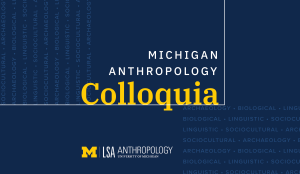Presented By: Department of Anthropology
Sociocultural Anthropology Colloquium | "Suspicion as Care: Reportage and Accusation in Perú’s Community Mental Health Reform"
Julio Villa-Palomino, Ph.D., Assistant Professor, Anthropology, University of Michigan; Postdoctoral Fellow, Michigan Society of Fellows

"Perú initiated the implementation of a Community Mental Health model in 2016 after decades of reports about human rights violations in asylums. Now, clients are being deinstitutionalized from psychiatric hospitals and transitioned back to their households. However, this reform has been met with an unexpected increase in mutual suspicion as well as practices of supervision and accusation that challenge two assumptions: that there is a community, and that care can be performed there.
In this talk, I explore how the Community Mental Health model and the process of psychiatric deinstitutionalization are transforming the everyday lives of residents of Ciudad Norte, an impoverished district located at the outskirts of Lima, where the reform started. Drawing on 18 months (2021-2022) of ethnographic fieldwork, I evidence how this reform is not a withdrawal from the state, but a series of interventions that recalibrate residents’ subjectivities. Residents are encouraged to report neighbors’ behaviors that might indicate a mental health problem or poor care for the mentally ill, blurring the lines between truth and rumor, care and coercion, informing on and helping out. These practices of reportage and accusation—that I call suspicion as care—are informed by the mental health reform, the legacies of political violence in the 1980s, the Fujimori dictatorship in the 1990s, and the global health enterprise."
Julio Villa-Palomino is an anthropologist of mental health working at the intersections of Latin American studies and Surveillance studies. He received his Ph.D. from The University of North Carolina at Chapel Hill and is currently a fellow in the University of Michigan Society of Fellows.
Julio’s research explores Perú’s transition from mental health care in psychiatric hospitals to a Community Mental Health model. His work has been funded by the National Science Foundation, the Wenner-Gren Foundation, and the Society for Psychological Anthropology. Julio's public-facing and community-oriented work has resulted in the implementation of a job support program for people diagnosed with severe mental illness, the creation of a digital platform for mental health advocacy, and collaboration with Peru's National Institute of Mental Health.
In this talk, I explore how the Community Mental Health model and the process of psychiatric deinstitutionalization are transforming the everyday lives of residents of Ciudad Norte, an impoverished district located at the outskirts of Lima, where the reform started. Drawing on 18 months (2021-2022) of ethnographic fieldwork, I evidence how this reform is not a withdrawal from the state, but a series of interventions that recalibrate residents’ subjectivities. Residents are encouraged to report neighbors’ behaviors that might indicate a mental health problem or poor care for the mentally ill, blurring the lines between truth and rumor, care and coercion, informing on and helping out. These practices of reportage and accusation—that I call suspicion as care—are informed by the mental health reform, the legacies of political violence in the 1980s, the Fujimori dictatorship in the 1990s, and the global health enterprise."
Julio Villa-Palomino is an anthropologist of mental health working at the intersections of Latin American studies and Surveillance studies. He received his Ph.D. from The University of North Carolina at Chapel Hill and is currently a fellow in the University of Michigan Society of Fellows.
Julio’s research explores Perú’s transition from mental health care in psychiatric hospitals to a Community Mental Health model. His work has been funded by the National Science Foundation, the Wenner-Gren Foundation, and the Society for Psychological Anthropology. Julio's public-facing and community-oriented work has resulted in the implementation of a job support program for people diagnosed with severe mental illness, the creation of a digital platform for mental health advocacy, and collaboration with Peru's National Institute of Mental Health.